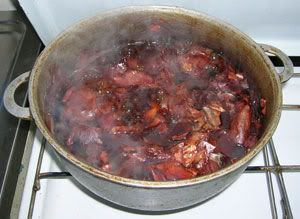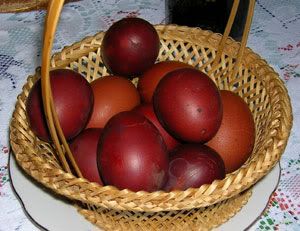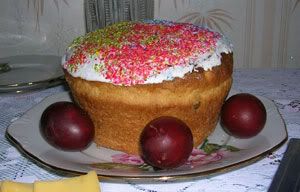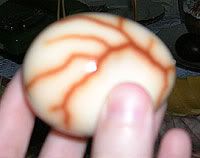No, I'm not a week late... Russian Orthodoxy celebrates Easter (or Paskha) a week later than Western Christan churches celebrate Easter. Why? I don't know. (Feel free to enlighten me! My students said it has something to do with the phases of the moon, although to the best of my knowledge, the scheduling of Western Easter is based on lunar cycles, so I'm not really sure how this works...) Anyway, several people have written to ask me how Russians celebrate Easter, and whether or not they have any pseudo-pagan traditions (i.e. the Easter Bunny) incorporated into their Easter celebration. Well, as far as I can tell (from both last Wednesday's Easter-topic in my conversation class and living with a Russian babushka), Paskha is a purely religious holiday, without much in the way of pagan-holdovers tacked on.
Russians do color eggs, and while nowadays egg-dye kits can be found in some stores, they prefer the traditional method of coloring eggs: boiling them with onion skins to produce eggs of a dark red color, which symbolizes the blood of Jesus. (And as both my students and Nina Mikhailovna said, this is a more natural way coloring eggs, and is therefore healthier.) Traditional Easter foods consist of these eggs, plus two different cakes, one called a Paskha and the other called a Kulich, which can either be purchased at a store or baked at home. Many Russians take these foods to church on the Saturday before Paskha to be blessed. (Yesterday I saw crowds of people laden with such foodstuffs heading to the various cathedrals around the city.) There is some very big and important Orthodox celebration at all of the churches at midnight (between Saturday and Sunday), although I know nothing about what it entails.
This morning, Nina M prepared a bit of an Easter feast for me for breakfast: a Paskha, a Kulich, dyed eggs, a box of chocolates, and ham and cheese sandwiches. Tons of food and quite delicious. So there you go, my little bit of knowledge on Easter traditions in Russia ends here.
Russians do color eggs, and while nowadays egg-dye kits can be found in some stores, they prefer the traditional method of coloring eggs: boiling them with onion skins to produce eggs of a dark red color, which symbolizes the blood of Jesus. (And as both my students and Nina Mikhailovna said, this is a more natural way coloring eggs, and is therefore healthier.) Traditional Easter foods consist of these eggs, plus two different cakes, one called a Paskha and the other called a Kulich, which can either be purchased at a store or baked at home. Many Russians take these foods to church on the Saturday before Paskha to be blessed. (Yesterday I saw crowds of people laden with such foodstuffs heading to the various cathedrals around the city.) There is some very big and important Orthodox celebration at all of the churches at midnight (between Saturday and Sunday), although I know nothing about what it entails.
This morning, Nina M prepared a bit of an Easter feast for me for breakfast: a Paskha, a Kulich, dyed eggs, a box of chocolates, and ham and cheese sandwiches. Tons of food and quite delicious. So there you go, my little bit of knowledge on Easter traditions in Russia ends here.

Eggs boiling in onion leaves. This requires brown eggs to begin with.
After Nina M boiled them, she let them sit in the onion leaves for about
24 hours and then boiled them again.

The end result.

An Easter cake with Easter eggs.

The looked really cool when peeled.

5 comments:
great post! I've been wondering about russian cooking and quisine.
The Russian idea of "natural" and "healthy" often are nothing more than quaint and old-fashioned ideas. The food coloring used for Easter Eggs here is extremely benign and Russians forget that many "natural" products are deadly toxic in their own right (umm ... like some varieties of wild mushrooms).
The orthodox easter and catholic easter are both determined by some lunar cycle, and they occasionally fall on the same Sunday - but typically are a week apart. It has to do with the Gregorian vs. Julian calendar change, which the Orthodox church never adopted for determining Easter.
Orthodox "Easter Day... is the first Sunday after the Full Moon which happens upon or next after the twenty first of March; and if the Full Moon happen upon a Sunday, Easter Sunday is the Sunday after. The Eastern Church still observes the rule laid down by the Council of Nicea (A.D. 325) and now disregarded by the Western Church, that the Christian Easter shall never precede or coincide with Jewish Passover, but must always follow it. Easter cannot fall earlier than April 5 or later than May 8. The Full Moon used for the purposes of the Easter reckoning is the fourteenth day of a Lunar Moon reckoned according to the ancient Ecclesiastical computation, and not the real Astronomical Full Moon."
Wow, I can't believe those eggs were in the dye for 24 hours! What a rich color, I've used onion skins to dye wool yarn for weaving, but never got that color. How was the taste?
Easter vigil is a pretty popular service with Catholics and Episcopalians in the States as well. The service is really the first celebration of Easter b/c, as I understand, new days in Jesus' time began at sunset the night before. So the Easter celebration is the first celebration that Jesus had been resurrected.
There are usually lots of baptisms or confirmations that evening as well. Some services can go past midnight. Some churches also have really early services, like at dawn on Sunday morning. I always remember it too as the first time we could say "alleluia" in the service since the beginning of lent.
I don't know that much about Eastern Orthodoxy, but I imagine the reason for the service is similar to the Anglican and Roman Catholic traditions.
those "natural"-dyed eggs ended up looking much cooler than our cheap-ass dollar store dyeing kit eggs. happy orthodox easter!
A very tardy comment to say that the kulich ("Easter cake") in the photo was probably delicious but its shape was not traditional. They are supposed to be cylindrical--noticeable taller than their diameter.
Cheers!
Kolya
Post a Comment